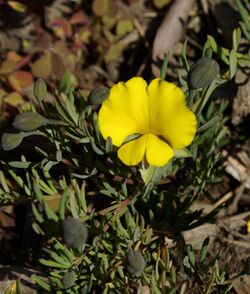Biology:Gompholobium huegelii
| Common wedge-pea | |
|---|---|

| |
| Gomphobium huegelii in the Royal Tasmanian Botanical Gardens | |
| Scientific classification | |
| Kingdom: | Plantae |
| Clade: | Tracheophytes |
| Clade: | Angiosperms |
| Clade: | Eudicots |
| Clade: | Rosids |
| Order: | Fabales |
| Family: | Fabaceae |
| Subfamily: | Faboideae |
| Genus: | Gompholobium |
| Species: | G. huegelii
|
| Binomial name | |
| Gompholobium huegelii Benth.[1]
| |
| Synonyms[1] | |
| |
Gompholobium huegelii, commonly known as common wedge-pea[2] is a species of flowering plant in the family Fabaceae and is endemic to south-eastern Australia. It is an erect or spreading shrub with trifoliate leaves and cream-coloured to yellow and greenish, pea-like flowers.
Description
Gompholobium huegelii is an erect or spreading, more or less glabrous shrub that typically grows to a height of up to 1 m (3 ft 3 in). The leaves are trifoliate with linear to lance-shaped leaflets with the narrower end towards the base, 5–20 mm (0.20–0.79 in) long and 0.5–2.0 mm (0.020–0.079 in) wide with the edges rolled under and bristly stipules at the base. The flowers are arranged singly or in small groups on the ends of branchlets, each flower 15–20 mm (0.59–0.79 in) long on a pedicel up to 15 mm (0.59 in) long. The sepals are up to 10 mm (0.39 in) long and the flowers are cream-coloured to yellow apart from the yellowish-green keel. Flowering occurs in most months with a peak between September and April, and the fruit is an oval pod up to 15 mm (0.59 in) long.[2][3][4]
Taxonomy and naming
Gompholobium huegelii was first formally described in 1837 by George Bentham in Stephan Endlicher's Enumeratio plantarum quas in Novae Hollandiae ora austro-occidentali ad fluvium Cygnorum et in sinu Regis Georgii collegit Carolus Liber Baro de Hügel.[5][6] The specific epithet (huegelii) honours Charles von Hügel.[7]
Distribution
Common wedge-pea grows in heathland and forest in the far south-east of Queensland through the coast, tablelands and western slopes of New South Wales, the higher rainfall areas of Victoria and to Tasmania where it is widespread and common.[2][3][4][8]
References
- ↑ 1.0 1.1 "Gompholobium huegelii". Australian Plant Census. https://biodiversity.org.au/nsl/services/apc-format/display/78911.
- ↑ 2.0 2.1 2.2 "Gompholobium huegelii". Royal Botanic Garden Sydney. https://plantnet.rbgsyd.nsw.gov.au/cgi-bin/NSWfl.pl?page=nswfl&lvl=sp&name=Gompholobium~huegelii.
- ↑ 3.0 3.1 Jeanes, Jeff A.. "Gompholobium huegelii". Royal Botanic Gardens Victoria. https://vicflora.rbg.vic.gov.au/flora/taxon/a8745161-decb-4346-a37c-df1b836d4a38.
- ↑ 4.0 4.1 Wood, Betty. "Gompholobium huegelii". Lucid Keys. https://apps.lucidcentral.org/plants_se_nsw/text/entities/gompholobium_huegelii.htm.
- ↑ "Gompholobium huegelii". APNI. https://id.biodiversity.org.au/instance/apni/493917.
- ↑ Bentham, George (1837). Enumeratio plantarum quas in Novae Hollandiae ora austro-occidentali ad fluvium Cygnorum et in sinu Regis Georgii collegit Carolus Liber Baro de Hüge. p. 29. https://babel.hathitrust.org/cgi/pt?id=chi.64405481&view=1up&seq=39. Retrieved 12 August 2021.
- ↑ Sharr, Francis Aubi; George, Alex (2019). Western Australian Plant Names and Their Meanings (3rd ed.). Kardinya, WA: Four Gables Press. p. 219. ISBN 9780958034180.
- ↑ Jordan, Greg. "Gompholobium huegelii". University of Tasmania. https://www.utas.edu.au/dicotkey/dicotkey/FAB/sGompholobium_huegelii.htm.
Wikidata ☰ Q5581267 entry

